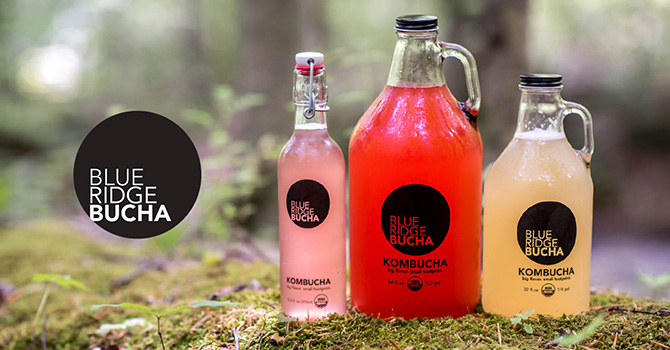Virginia-based kombucha brand Blue Ridge Bucha announced last week that it has been acquired by Hank Heyming, a venture capitalist who is also the co-founder and a managing partner of Trolley Ventures. Terms of the deal were not disclosed.
Though new to the beverage industry, Heyming, now also the company’s CEO, told BevNET that he chose to buy Blue Ridge because he was looking to run an entrepreneurial business for himself. At Trolley, he had been involved in brokering deals in the food and beverage space, including with non-dairy gelato maker O’MY! Foods.
“I was familiar with [Blue Ridge Bucha], I liked the brand quite a bit, and so I grabbed on and didn’t let go,” Heyming said. “I had been helping people run manufacturing businesses since 2013, so I wanted to do something where I could be running a business but doing it for myself.”
Founded in 2010 by Kate and Ethan Zuckerman, Blue Ridge Bucha is a regional beverage brand with distribution in eight Mid-Atlantic states plus Washington, D.C. The brand’s footprint covers nearly 300 retail stores including Whole Foods, according to Heyming. The company’s organic kombuchas feature flavors such as Original Ginger, Black Raspberry, Bluegrass Bucha, Elderflower Sunrise, Jasmine Grape and Wild Pear available in 12 oz. bottles.
According to Kate Zuckerman, she and her husband Ethan decided to sell the company in order to spend more time with family before eventually moving on to a new venture down the line. She said that they had never expected Blue Ridge Bucha to grow to its current size — north of $1 million in sales — but she felt confident that they were exiting with the company in good shape.
“In the cycle of business ownership you have ups or downs and, even as this is a pandemic year, the business is in a very strong position,” Zuckerman said. “So it feels good to pass it on to someone and hand them the reins when you know that you’re giving them something that’s awesome and that they really are going to be able to thrive with.”
Heyming said he believes the brand can grow significantly into a “super regional” brandover the next few years, starting by adding new states “in the next quarter or two”. However, he acknowledged that the brand’s namesake, the Blue Ridge Mountains, may not resonate in other parts of the U.S. and suggested that he may move to expand the brand platform by developing sub brands with localized names.
The company currently operates a single production facility in Waynesboro, Va. but Heyming aims to open an additional Virginia facility in the near future to support expansion. He noted that had growth continued at its 2019 rate, before the pandemic began, the current facility would have reached capacity this year.
While retail sales remain steady for Blue Ridge, including refillable growlers which are a strong revenue driver, Heyming said that the brand’s keg and taproom business have taken a hit due to COVID-19. Though sales to bars, restaurants and college campuses are returning, he said sales in those spaces are down roughly 50-60% from 2019.
Currently, event and taproom staff are no longer with the company but Blue Ridge has seven full-time production staff as well as consultants handling retail store visits. Heyming said he plans to grow the team in the coming months.
“This business has grown through word of mouth with very little marketing spend,” Heyming said. “The original owners had started doing this out of their garage, so I plan to expand the sales and the marketing efforts quite a bit.”
